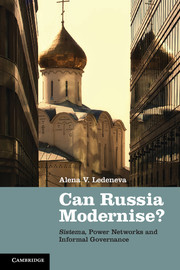Can Russia Modernise?
In this original, bottom-up account of the evolution of contemporary Russia, Alena Ledeneva seeks to reveal how informal power operates. Concentrating on Vladimir Putin's system of governance – referred to as sistema – she identifies four key types of networks: his inner circle, useful friends, core contacts and more diffuse ties and connections. These networks serve sistema but also serve themselves. Reliance on networks enables leaders to mobilise and to control, yet they also lock politicians, bureaucrats and businessmen into informal deals, mediated interests and personalised loyalty. This is the 'modernisation trap of informality': one cannot use the potential of informal networks without triggering their negative long-term consequences for institutional development. Ledeneva's perspective on informal power is based on in-depth interviews with sistema insiders and enhanced by evidence of its workings brought to light in court cases, enabling her to draw broad conclusions about the prospects for Russia's political institutions.
- The concept of sistema provides a new angle on the paradoxes of Russian modernisation, contributing both to the modernisation debate and to literature regarding governance in Russia
- Features exclusive sources of information following interviews with insiders of sistema
- Provides original information on the working of power networks – vertushka, allowing readers to see both local and global implications of sistema
Reviews & endorsements
"Until we have honest memoirs from members of the present Russian administration (if that ever happens), Ledeneva's book will remain the best guide to the way power is handled in Putin/Medvedev's Russia. It is perceptive, intelligent and based on meticulous, discriminating research."
Geoffrey Hosking, School of Slavonic and East European Studies, University College London
"This is a superb book that is rich in primary qualitative research and a unique topic and methodology … Understanding the inner workings, the secret system, of a foreign society is a major step toward doing profitable business in that society. Without this type of insider knowledge about any society, there are too many pitfalls to do business successfully … Great insight on the Russian mind and character."
Stanley K. Ridgley, Department of Management, LeBow College of Business, Drexel University
"… in a masterly fashion, [Ledeneva] translates the fluid and uncertain reality of Putin’s Russia into a comprehensive study of informal networks, political power and governance … [her] book is more than just a clever description of the visible contours of Putin’s political system. She uncovers the inner workings of what she calls the sistema: a set of common perceptions of power and the system of governance in Russia."
Vadim Kononenko, The Finnish Institute of International Affairs, International Affairs
"In her book, Can Russia Modernise?, [Ledeneva] explains the difference between blat, low-level corruption in which the economy runs on an exchange of favours, and the full-blown sistema of the modern Kremlin … in her relentlessly careful way, [she] itemises the tariffs of Russian corruption: $10m for a minister’s seat or $100,000 a month to officials as 'the basis of good relations'. Her interviewees remind her that this is the system; ‘once you’re in,’ says one, ‘you can’t change it'."
The Economist
"The question of 'getting things done' in Russia is at the heart of Alena Ledeneva's … academic study, which builds on her earlier books … an important study that weaves together numerous illuminating anecdotes."
Andrew Monaghan, Times Literary Supplement
"Ledeneva offers an impressive analysis of the informal management of Russia during the Medvedev/Putin period. This volume is a natural continuation to her previous research study, How Russia Really Works, dealing mostly with the same subject during Yeltsin’s rule. This work is sharply critical of how Russia changed its economic structure and practices during the period when Putin became the strong man of the nation regardless of whether he was president of prime minster … Ledeneva has again achieved the assigned task: she has helped the audience understand how the modern Russian economy functions. Summing up: recommended. All readership levels."
Y. Polsky, Choice
"Following on from her two books on informal networks at the lower levels of Russian society during the late Soviet Union and in early post-communist Russia, Alena Ledeneva’s new work tackles the question of how elite networks at the very top of Russian politics are organised. In her usual thorough fashion, Ledeneva combines anthropological and sociological methods to analyse how informal elite networks emerge, work and reproduce themselves in Putin’s Russia."
Michael Rochlitz, Europe-Asia Studies
Product details
April 2013Paperback
9780521125635
327 pages
229 × 152 × 18 mm
0.49kg
11 b/w illus. 4 tables
Available
Table of Contents
- Introduction: modernising sistema
- 1. What is sistema?
- 2. Putin's sistema: svoi on top
- 3. The inner workings of sistema: from blat to otkat
- 4. Sistema's material culture: from vertushka to Vertu
- 5. 'Telephone justice' in the global age: from commands to signals
- 6. 'Werewolves in epaulets': from doublethink to doubledeed
- 7. From dealership to leadership: sistema and informal governance
- Conclusion.






